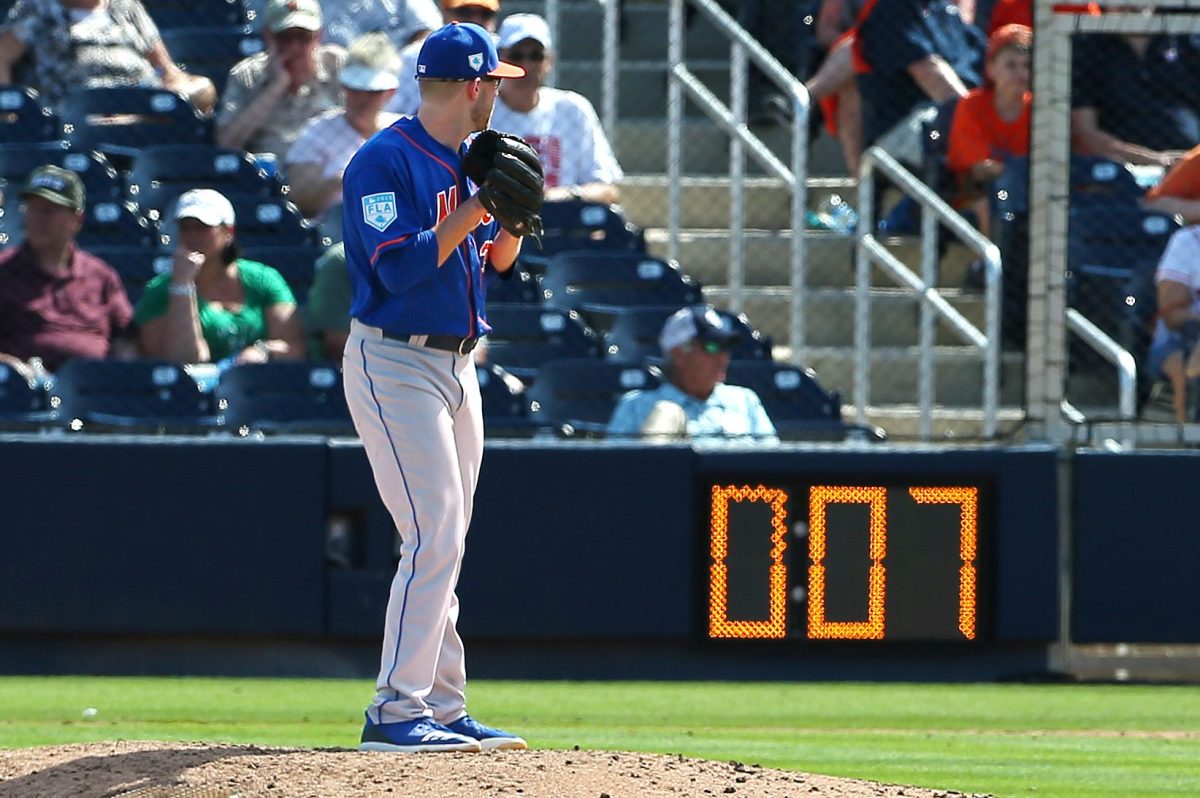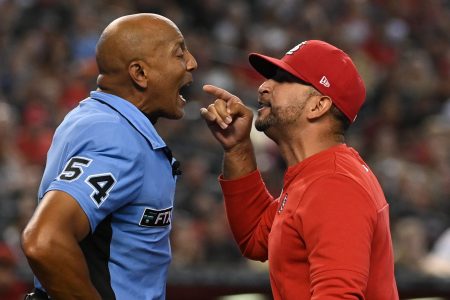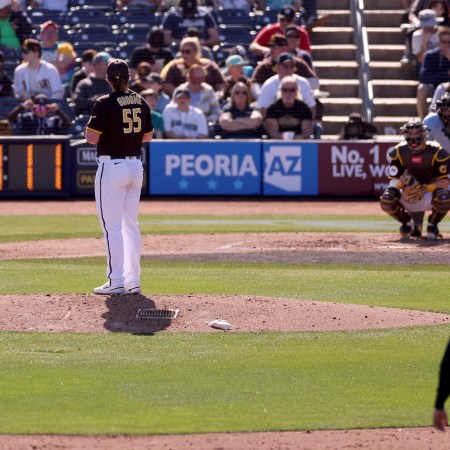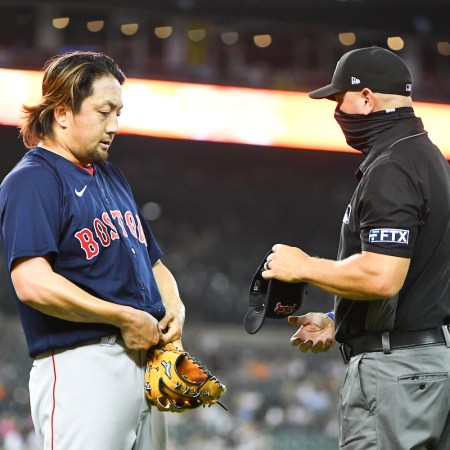Sure, you’ve already read tons of stuff about MLB’s new pitch clock. But all that was probably published before any games actually counted. After a weekend of watching some that have been permanently logged in the history books, it’s time for a real review: The pitch clock and the games that include it are moving too fast.
As Ken Burns’s narrator said in the epic PBS documentary, Baseball, “It is a leisurely game that demands blinding speed.” And as legendary broadcaster Bob Costas also said in the film, while explaining why he felt baseball is “beautiful,” the “pace and rhythm” of the game “allows for conversation, reflection, opinion and comparison.”
This is what baseball purists — like me — who love the game believe about it. And MLB, the prime stewards of the game, have made sure there’s less of it.
Something Worse Than the Pitch Clock Fiascos Happened in MLB This Weekend
With automated balls and strikes on the way, C.B. Bucknor refusing to shake Oli Marmol’s hand could be the last time there’s this much drama between umpires and managers. And that sucks.I’ll say here that the pace of MLB games did need to be sped up, at least a little bit. And while I don’t love that the powers that be instituted a clock in order to do so, there’s nothing I can do to change that. So I’ve done my best to accept it.
But while a small part of me is happy to consume complete baseball games in under three hours, in watching every Mets game from Opening Day on I can’t help but feel MLB overdid it with the speed of the pitch clock. Fifteen seconds to deliver a pitch with no runners on base — and seven seconds for a hitter to have eyes on the pitcher while in the box — is too short a time period.
You want to speed up the game? Fine. But this is a nearly panic attack-inducing pace.
I might be in the minority here. This past weekend, Los Angeles Dodgers manager Dave Roberts said of the pitch clock, per The Athletic, “It’s great. We’re getting back to the way the game was meant to be played.”
“The miserable game has become tolerable,” wrote The Athletic baseball writer Andy McCullough in that same article. “Texas’s 16-3 shellacking of the Phillies on Saturday finished in three hours and seven minutes — a mere minute longer than the average game in 2022. The tolerable game has become tidy: The Marlins downed the Mets, 2-1, on Friday in two hours and nine minutes.”
However, I’m not the only person who loves baseball and thinks there should more of it. There are also logistical concerns as well.
Dodgers shortstop Miguel Rojas said this about the pitch clock on Saturday, as tweeted by Fabian Ardaya, Dodgers reporter for The Athletic: “The pitch clock is hard…I feel like I need a little bit more of time there to be honest with you. It’s gonna be an adjustment for everybody…Games are gonna start to get a little bit more intense and you’re gonna get situations where you’re probably going to need a little bit more time.”
“It’s tough, this pitch clock,” said Marcus Stroman of the Chicago Cubs after his Opening Day start, in which he was called for a pitch clock violation. “It’s a big adjustment. I don’t think people really realize it. It just adds a whole other layer of thinking.”
That whole other layer of thinking has been problematic for umpires, too — not to mention journalists like me. On Opening Day, umpires added a strike to the count of Mets player Jeff McNeil because his teammate, Pete Alonso, had apparently taken too much time to return to first base after the at-bat’s first pitch. It appeared as though the umpires were operating within their rights. MLB had issued a memo to teams that said Blue could make judgment calls about acceptable effort levels of players returning to their positions. I’d reported as much, but one night later, the Mets broadcast booth, who’d called it correctly on Opening Day when they said the umpires were wrong in giving McNeil an extra strike, announced umpires had actually only been instructed to tell players in such situations to move along more quickly, without issuing penalties.
Snafus like that have been counterproductive in terms of speeding up the game. However, as everyone in the league — players, managers, umpires and even bat boys and girls — gets used to the newly legislated pace of play, they’ll fall to the wayside.
Still, the games will move too quickly, in the opinion of this fan and others.
“I’m a baseball fan, so if I stay here for four hours, for two hours, it doesn’t matter to me,” Ryan Murphy, who was attending a Marlins/Astros spring training game, told Boston.com in early March.
“I’m not a big fan of the pitch count,” said another fan, Mark Mezzatesta, in the same piece. “I feel like that’s rushing the game. I feel it was fine the way it was. Pitchers do take a while. And batters do take a while, too. Fifteen seconds with nobody on base and 20 seconds with somebody on base is too short.”
I’m also not the only columnist at this pitch-clock hate party.
“If you’re not at the ballpark for at least four hours, it’s not even worth your time and money,” wrote Jason Foster for The Sporting News on Opening Day. “Short games just aren’t real baseball. If it takes less than 30 seconds between pitches, or if there’s only a minute or two between balls in play, well, that’s just an unrecognizable sport. It’s certainly not the game we’ve come to love. Some people will tell you that the quicker pace forced by the pitch clock is actually a good thing, but those people are idiots.”
I surrender to the fact that the pitch clock is here to stay, because as another columnist, Jason Gay, wrote in the Wall Street Journal, “if baseball doesn’t do something to speed itself up, it’s going the way of the Betamax rental.”
But for the love of baseball: MLB, can you maybe just add, like, three seconds to it?
The Charge will help you move better, think clearer and stay in the game longer. Subscribe to our wellness newsletter today.


















